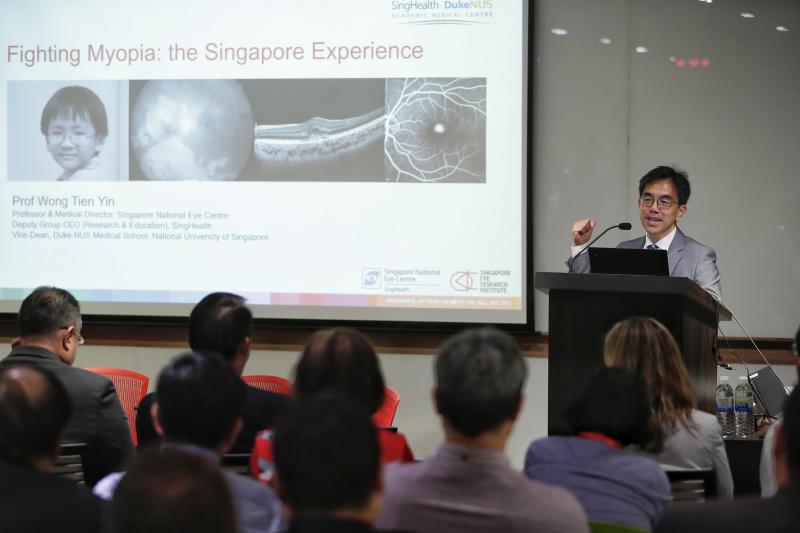New centre to prevent, control and treat myopia to open in the first quarter of 2019
Sign up now: Get ST's newsletters delivered to your inbox

Professor Wong Tien Yin, medical director of the Singapore National Eye Centre, delivering a presentation during the Joint Meeting on Myopia on Nov 13, 2018.
ST PHOTO: KEVIN LIM
SINGAPORE - The fight against myopia, commonly known as short-sightedness, is set to receive a boost with a new centre focused on initiatives to prevent, control and treat the condition opening in the first quarter of 2019.
The Singapore National Eye Centre (SNEC) Myopia Centre, which will be located at the former Bedok polyclinic, will offer clinical services - including myopia eye screenings and specialist consultations - and conduct clinical and product trials.
Making the announcement on Tuesday (Nov 13), Senior Minister of State for Health and Transport Lam Pin Min said: "The prevalence of myopia in Singapore is among the highest in the world."
"It is crucial that we take active steps in raising awareness, improving service delivery, and continue research to reduce the disease burden caused by myopia," he said.
Myopia is an irreversible condition that is projected to affect almost half of the world's population by 2050. One billion people are also expected to have high myopia by 2050, which can lead to retinal disease, with increased risks of blindness.
The Health Promotion Board (HPB) had previously said the condition has remained constant in Singapore over the past 10 years - at 65 per cent among Primary 6 pupils and 28 per cent among those in Primary 1.
Professor Wong Tien Yin, medical director of SNEC, said the Myopia Centre will focus on the prevention and control of myopia, and provide enhanced patient counselling as well.
"At SNEC, we are committed to provide the highest quality ophthalmic care, and with the centre, we are able to channel our efforts into the prevention, control and the treatment of myopia," he added.
Dr Lam said the centre will also work to create greater public awareness of the condition.
While myopia is in part genetic, experts say Singapore has one of the highest rates because children here spend less time outdoors and more time reading and writing.
Singapore has taken various measures to combat myopia in recent years. There has been an increased prescription of eye drops containing the chemical atropine, which helps to control childhood myopia even at 0.01 per cent concentration.
The HPB also introduced several initiatives under the National Myopia Prevention Programme, targeting children under 12. For instance, HPB provides a Spectacle Voucher Fund, where it gives financial aid to underprivileged students who need glasses, and facilitates vision screening in pre-schools, primary and secondary schools.
The Education Ministry has also incorporated outdoor programmes into curriculum hours as spending time outdoors has a positive impact on eyesight. According to a World Health Organisation report released in 2015, the risk of myopia is reduced when children spend more than two hours outdoors every day.
The Myopia Centre announcement was made at the Joint Meeting on Myopia, organised by the Singapore Eye Research Institute (SERI), a subsidiary of the SNEC; the World Health Organisation (WHO); the International Agency for the Prevention of Blindness (IAPB); and the Brien Holden Vision Institute (BHVI).
To be held over two days from Tuesday, the meeting brings together 40 scientists, researchers, clinical professionals and policymakers from across the Pacific, Oceania, and parts of Asia.
News of the Myopia Centre follows in the wake of a $36.35 million research collaboration between the SNEC, SERI, and Johnson & Johnson Vision announced on Monday.
The collaboration is the first-of-its-kind public-private strategic partnership in Asia focused on myopia, with the aim of understanding how myopia develops and how it progresses, as well as creating novel therapies and methods to prevent the onset and progression of the condition.


